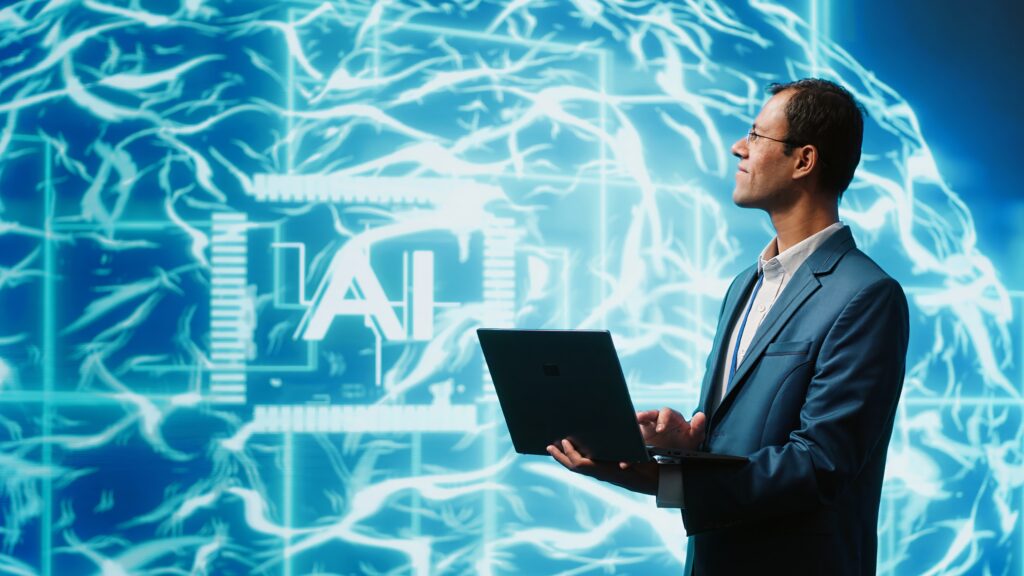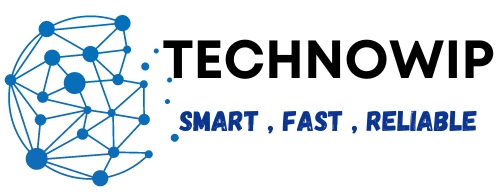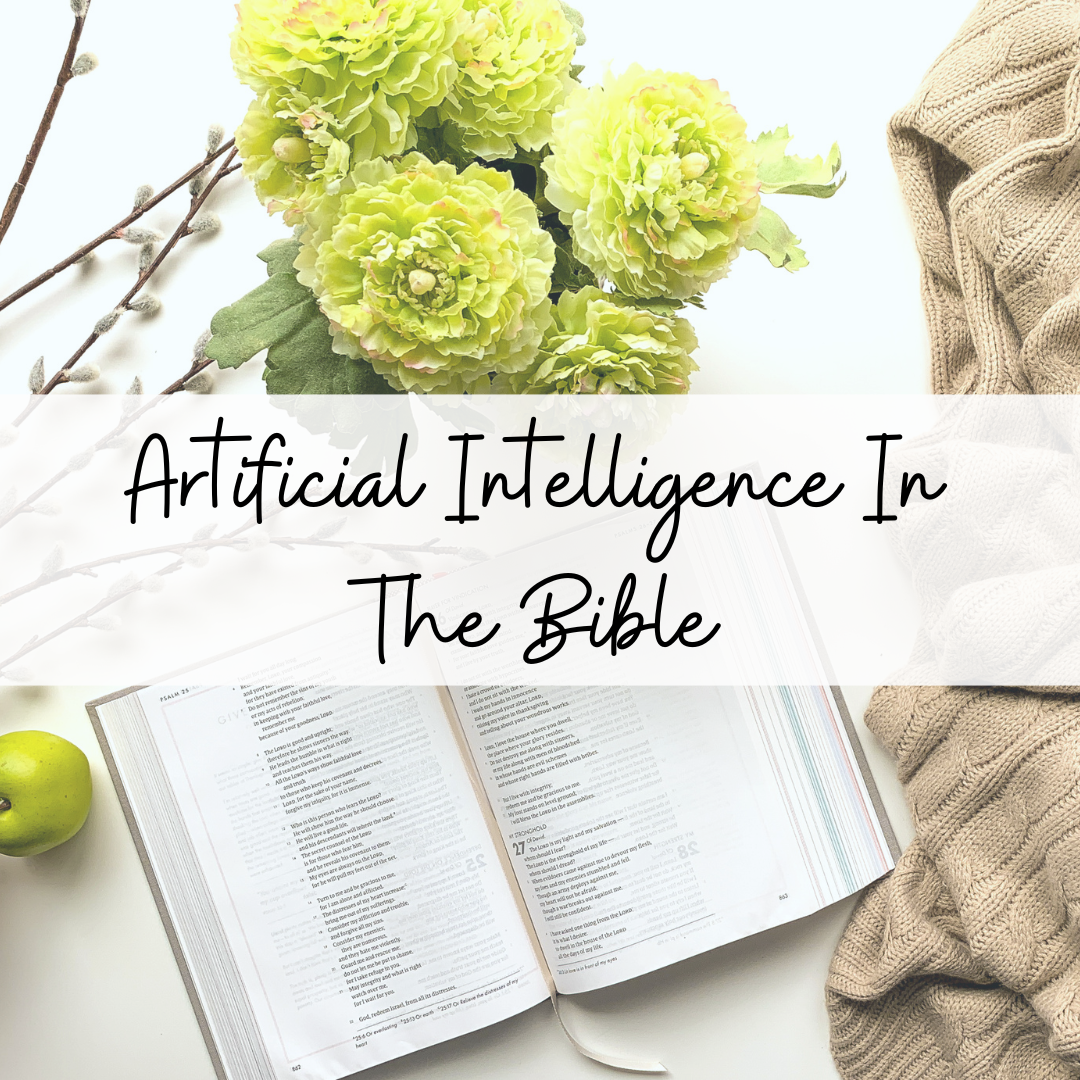Introduction
Artificial Intelligence In The Bible is such an important topic. AI (Artificial Intelligence) has become an empowering technology across several fields from healthcare to education, but how much of its origins lie within ancient texts like the Bible? While not directly mentioning algorithms or machine learning principles and techniques found within it’s teachings making AI relevant in today’s conversations for centuries! This article delves deeper into this timeless conversation while looking into its benefits and drawbacks with Biblical references that align to modern AI’s potentials and limitations for humanity alike.

The Bible and Creation: A Reflection on AI Development
Genesis recounts God creating humanity in His image. AI represents humanity’s attempt at recreating itself atop this foundational theme of creation, by developing systems capable of replicating human decision making, problem-solving and emotion processing similar to God creating humans after Him! . However, creating something is always associated with an inherent degree of responsibility: creator or created?
AI creators frequently face moral quandaries that parallel biblical themes of accountability. Just as Adam and Eve had free will, so AI systems being designed with autonomy raise ethical considerations about how much control humans should exercise over their creations. This connects directly to biblical themes of stewardship.
The Tower of Babel and Modern AI: Lessons on Limits
The tale of Babel (Genesis 11) illustrates humanity’s desire to attain divine heights. They constructed an ambitious tower but God intervened, scattering their efforts before their overreach was complete. We see similar dynamics today with AI development. While AI offers great potential benefits, unchecked ambition may cause issues like surveillance misuse, job displacement or misinformation if taken too far.
The Bible warns against hubris, encouraging humility and responsibility. AI requires striking a delicate balance between innovation and ethical considerations just as society learned with Babel’s destruction. Thus society must approach AI carefully so as not to create technologies which disrupt global peace.
Wisdom Literature and AI Decision-Making
Proverbs and Ecclesiastes both emphasize wisdom, discernment and knowledge principles which align perfectly with AI systems’ primary function of making data-based decisions. AI systems analyze massive amounts of information in order to provide valuable insight, just like biblical wisdom texts do when helping guide decision making processes.
AI in healthcare has revolutionized diagnostics and has made decisions which save lives. Proverbs 3:13-14 extolls wisdom as more profitable than silver, producing greater returns than gold; although AI may not possess spiritual wisdom as defined by these texts.
Personal Reflection: Wrestling with AI’s Potential
AI can often leave me questioning its connection to my faith, yet its potential benefits such as in medical research or education cannot be ignored. At other times, however, its presence can seem like humanity is playing god and at such times I turn back to Scripture for guidance trusting its timeless wisdom as I navigate new challenges head-on.

AI and the Biblical Call for Stewardship
The Bible stresses the importance of taking responsibility for creation. Genesis 2:15 states this fact clearly when God placed man into Eden to tend the Garden and take care of its care.” We as AI developers should apply this same stewardship principle responsibly when using AI technology for advancement or else risk its misuse being detrimental to humanity and harm.
AI technology has shown great promise in combatting global challenges like climate change and poverty. AI-powered weather prediction systems predict weather patterns to optimize agricultural production fulfilling God’s call to care for creation according to Scripture. However, with great power comes great responsibility.
Moral Dilemmas: Free Will and AI Autonomy
The Bible’s discussion of free will is an intriguing parallel with AI autonomy. Humans were given freedom of action upon creation in God’s image. Similarly, AI operates autonomously under programming control raising questions of accountability when AI systems make potentially damaging decisions is it up to its programmer or the machine itself to take responsibility when such decisions go awry?
This dilemma recalls the Biblical story of choices and consequences, where humanity faces judgment for their choices; therefore we must ensure AI systems reflect Biblical ideals of justice and fairness in terms of accountability.
Personal Reflection: The Complexity of Ethics
My conversations with friends often revolve around AI’s ethical challenges. Sometimes this topic seems daunting how do we ensure these systems will stay ethical long term? Turning back to biblical teachings for guidance helps me maintain focus by reminding me to prioritize values like honesty, justice and kindness when using technology.
Prophecy and AI: Foreseeing a Future
The Bible contains many prophecies about our future that harken to AI’s prophetic visions of prediction. AI, however, is already shaping it profoundly. For instance, predictive analytics. One core function of AI resembles foretelling events to an extent. Although AI cannot accurately foresee future events directly like humans could do, its ability to analyze trends and provide insights is unparalleled and transformative.
But biblical prophecies often came with warnings. So does AI’s rise require constant monitoring in order to avoid unintended ramifications ranging from job automation and potential use in warfare .Just as Biblical prophets warned people in order to prepare and repentance before certain predictions came to fruition.

Personal Reflection: Finding Hope in the Unknown
Sometimes I feel uncertain of the future AI is shaping. Will AI bring more harm than good? But the Bible gives me comfort that its ultimate plans for good can also benefit humanity if used responsibly for positive transformation of humanity’s destiny.
The Role of Faith in Shaping AI Ethics
Faith communities play an indispensable role in shaping AI ethics. By drawing inspiration from Biblical principles like love, justice and humility to guide policymakers and technologists. In fact religious leaders have begun advocating for AI frameworks which put human dignity ahead of profit maximization.
Organizations like the Vatican’s “Rome Call for AI Ethics” demonstrate how faith and technology can interweave. This initiative promotes AI systems which honor humanity and the environment reflecting Biblical themes of stewardship and compassion with spiritual guidance ensuring AI development aligns with moral principles that benefit everyone involved.
Personal Reflection: Balancing Faith and Technology
As someone who holds faith dear, I often question its place within technology. Over time I’ve come to recognize that faith doesn’t prohibit innovation but allows it responsibly, which for me means using Scripture as my compass while staying grounded with my values in AI’s complex realms.
The Apocalypse and AI: A Modern Interpretation
The Book of Revelation describes an end-times scenario often understood to be a battle between good and evil, which some draw parallels between and AI’s potential misuse as seen through AI systems being deployed for control or destruction purposes Revelation warns us about.
However, the Bible also presents a vision of redemption and renewal similar to AI technology’s potential of helping solve pressing global issues when guided by ethical principles. Therefore humanity needs to keep control of using AI for good rather than harm.

Personal Reflection: Trusting the Bigger Picture
As I feel overwhelmed by AI’s rapid advancements, I rely on scripture’s fundamental message of the importance of God being in control. This helps provide me peace in knowing that while AI may alter our world today, its influence does not alter God’s greater plan for humanity’s survival.
Exploring Biblical Perspectives on Artificial Intelligence and Ethical Insights
1. Does the Bible Mention Artificial Intelligence?
This question about AI and Biblical teachings has long been one of the most searched queries related to this intersection. While no mention was ever made in Scripture of AI per se, many scholars and theologians draw parallels between Biblical themes such as creation and free will with ethical dilemmas associated with artificial intelligence today.
2. Ethical Concerns About AI From a Biblical Perspective
AI presents many ethical concerns, from accountability and bias issues to misuse. Many of these ethical considerations echo Biblical teachings on justice, fairness and human life value; concepts like free will and stewardship provide a basis for approaching AI ethics responsibly through creation and use.
3. Is AI Compatible With Christian Beliefs?
AI can raise questions of its compatibility with Christian faith. However, AI remains just a tool, how it’s used will ultimately determine its alignment with Biblical ethics. For instance, using it to improve healthcare or fight poverty reflect these Christian principles of compassion and stewardship. However its misuse for harmful purposes or exploitative purposes contradicts these tenets of ethics.

4. What Does the Bible Say About Creation and Technology?
The Bible portrays God as the ultimate creator, while humanity serves as His stewards. AI creation mirrors this relationship as humans attempt to develop systems in their image reminding us to observe humility and ethical standards when innovating new systems. Stories such as Tower of Babel serve as reminders that innovation must remain humble.
5. The Role of Faith in AI Development
Faith communities have increasingly taken an interest in AI development. Leveraging Biblical principles like love, justice and stewardship as guides, they advocate for ethical AI frameworks to protect human dignity while meeting global challenges like inequality and climate change.
6. Biblical Prophecies and AI in the Modern World
Some draw parallels between Biblical prophecies like those found in Revelation and AI’s transformative potential. While such comparisons remain speculation heavy, these discussions focus on using AI only for good and not to harm or control others with particular attention paid to maintaining moral responsibility of its implementation.
7. Can AI Be a Tool for Good According to the Bible?
AI can have a positive impact on society when used responsibly. AI applications that align with Biblical values include improving education, healthcare and environmental conservation applications which demonstrate its potential positive contribution. These applications reflect God’s call to care for creation while serving others – all evidences that AI’s use has the power to positively shape society.

Conclusion
Although artificial intelligence (AI) may not explicitly appear in Scripture, its teachings offer invaluable wisdom on how to approach its development responsibly and ethically. From creation and accountability through prophecy and stewardship – Scripture offers invaluable wisdom that can assist humanity in using AI ethically.
At this juncture in our AI future, the Bible reminds us to prioritize values like justice, humility and love when aligning technology with these principles helping ensure it serves as an agent of good and fulfills its responsibility to fulfill everyone and every corner of this Earth.
FAQS
Does the Bible explicitly address artificial intelligence?
Nowhere does the Bible directly mention artificial intelligence because this technology did not yet exist when its writing took place, however many Biblical themes like creation, free will and stewardship resemble AI’s ethical and philosophical dilemmas.
How can Biblical principles inform artificial intelligence development?
Biblical principles such as justice, compassion and stewardship provide ethical AI development guidelines. By following them closely they help ensure AI benefits humanity without creating harm or exploiting people in any way.
Are Christian beliefs compatible with using artificial intelligence (AI)?
Yes, artificial intelligence aligns well with Christian principles when used for good and ethically sound purposes that serve others or address global challenges. Any misuse or unethical applications violate Christian tenets.
What do the scriptures tell us about humans creating artificially intelligent systems?
The Bible emphasizes God as the ultimate creator and humanity as His stewards. Although building intelligent systems like AI reflects human ingenuity, its creation must always be done responsibly with humility and accountability in mind.
Can Artificial Intelligence (AI) be utilized for good according to Scripture?
Yes, AI can be harnessed for positive use to address society-wide issues like poverty, healthcare access and environment preservation such applications align with biblical principles of serving humanity while taking care to preserve creation.
What ethical challenges does AI present from a biblical viewpoint?
Ethical challenges associated with AI decisions include accountability and misuse, justice and fairness and protecting human life sanctity issues which resonate strongly with biblical teachings about responsibility and respecting life as sacred.
Exist any Biblical cautionary tales regarding AI’s overreach?
Biblical tales like The Tower of Babel offer us a warning against excessive pride and overreaching when developing AI technologies, reminding us to approach AI development with humility and ethical constraints in mind to prevent potential harm from occuring.
Can religious communities influence AI ethics?
Yes, religion communities play an integral part in shaping AI ethics by advocating for frameworks that uphold human dignity, justice and stewardship. Thus assuring AI conforms with moral values.
What similarities exist between Biblical prophecy and AI?
Biblical prophecy often includes warnings about future challenges. Similarly, AI’s potential misuse or transformative impact requires careful vigilance and ethical foresight to avoid potential harm to individuals or society as a whole.
How can the Bible assist with AI’s complexity?
The Bible contains timeless wisdom on accountability, justice and love that can assist individuals and communities when approaching AI using values-driven methods.

